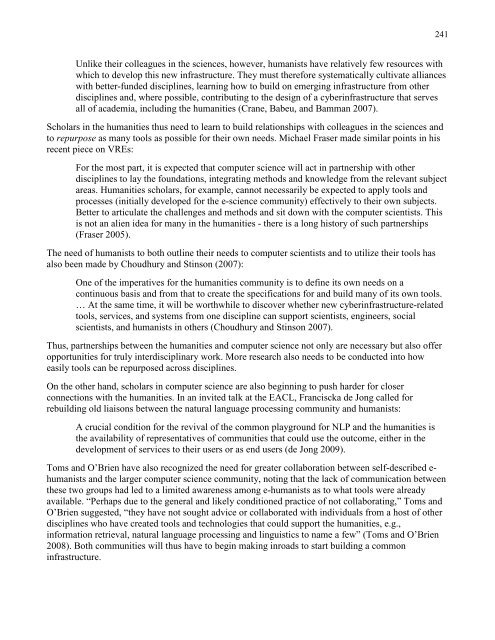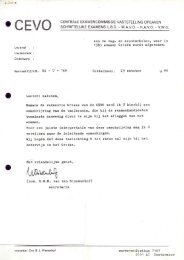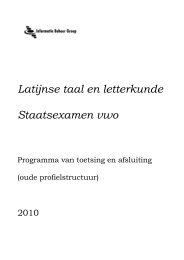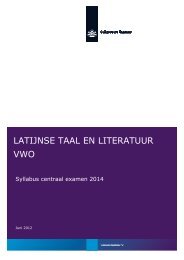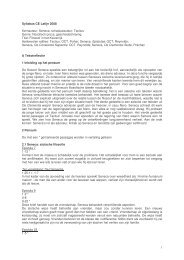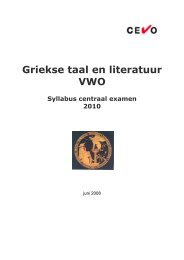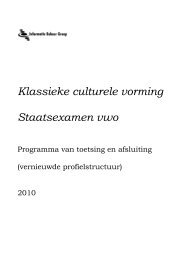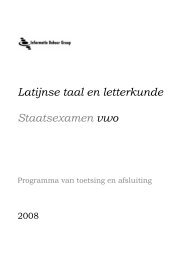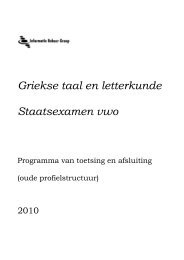Rome Wasn't Digitized in a Day - Council on Library and Information ...
Rome Wasn't Digitized in a Day - Council on Library and Information ...
Rome Wasn't Digitized in a Day - Council on Library and Information ...
You also want an ePaper? Increase the reach of your titles
YUMPU automatically turns print PDFs into web optimized ePapers that Google loves.
241<br />
Unlike their colleagues <str<strong>on</strong>g>in</str<strong>on</strong>g> the sciences, however, humanists have relatively few resources with<br />
which to develop this new <str<strong>on</strong>g>in</str<strong>on</strong>g>frastructure. They must therefore systematically cultivate alliances<br />
with better-funded discipl<str<strong>on</strong>g>in</str<strong>on</strong>g>es, learn<str<strong>on</strong>g>in</str<strong>on</strong>g>g how to build <strong>on</strong> emerg<str<strong>on</strong>g>in</str<strong>on</strong>g>g <str<strong>on</strong>g>in</str<strong>on</strong>g>frastructure from other<br />
discipl<str<strong>on</strong>g>in</str<strong>on</strong>g>es <strong>and</strong>, where possible, c<strong>on</strong>tribut<str<strong>on</strong>g>in</str<strong>on</strong>g>g to the design of a cyber<str<strong>on</strong>g>in</str<strong>on</strong>g>frastructure that serves<br />
all of academia, <str<strong>on</strong>g>in</str<strong>on</strong>g>clud<str<strong>on</strong>g>in</str<strong>on</strong>g>g the humanities (Crane, Babeu, <strong>and</strong> Bamman 2007).<br />
Scholars <str<strong>on</strong>g>in</str<strong>on</strong>g> the humanities thus need to learn to build relati<strong>on</strong>ships with colleagues <str<strong>on</strong>g>in</str<strong>on</strong>g> the sciences <strong>and</strong><br />
to repurpose as many tools as possible for their own needs. Michael Fraser made similar po<str<strong>on</strong>g>in</str<strong>on</strong>g>ts <str<strong>on</strong>g>in</str<strong>on</strong>g> his<br />
recent piece <strong>on</strong> VREs:<br />
For the most part, it is expected that computer science will act <str<strong>on</strong>g>in</str<strong>on</strong>g> partnership with other<br />
discipl<str<strong>on</strong>g>in</str<strong>on</strong>g>es to lay the foundati<strong>on</strong>s, <str<strong>on</strong>g>in</str<strong>on</strong>g>tegrat<str<strong>on</strong>g>in</str<strong>on</strong>g>g methods <strong>and</strong> knowledge from the relevant subject<br />
areas. Humanities scholars, for example, cannot necessarily be expected to apply tools <strong>and</strong><br />
processes (<str<strong>on</strong>g>in</str<strong>on</strong>g>itially developed for the e-science community) effectively to their own subjects.<br />
Better to articulate the challenges <strong>and</strong> methods <strong>and</strong> sit down with the computer scientists. This<br />
is not an alien idea for many <str<strong>on</strong>g>in</str<strong>on</strong>g> the humanities - there is a l<strong>on</strong>g history of such partnerships<br />
(Fraser 2005).<br />
The need of humanists to both outl<str<strong>on</strong>g>in</str<strong>on</strong>g>e their needs to computer scientists <strong>and</strong> to utilize their tools has<br />
also been made by Choudhury <strong>and</strong> St<str<strong>on</strong>g>in</str<strong>on</strong>g>s<strong>on</strong> (2007):<br />
One of the imperatives for the humanities community is to def<str<strong>on</strong>g>in</str<strong>on</strong>g>e its own needs <strong>on</strong> a<br />
c<strong>on</strong>t<str<strong>on</strong>g>in</str<strong>on</strong>g>uous basis <strong>and</strong> from that to create the specificati<strong>on</strong>s for <strong>and</strong> build many of its own tools.<br />
… At the same time, it will be worthwhile to discover whether new cyber<str<strong>on</strong>g>in</str<strong>on</strong>g>frastructure-related<br />
tools, services, <strong>and</strong> systems from <strong>on</strong>e discipl<str<strong>on</strong>g>in</str<strong>on</strong>g>e can support scientists, eng<str<strong>on</strong>g>in</str<strong>on</strong>g>eers, social<br />
scientists, <strong>and</strong> humanists <str<strong>on</strong>g>in</str<strong>on</strong>g> others (Choudhury <strong>and</strong> St<str<strong>on</strong>g>in</str<strong>on</strong>g>s<strong>on</strong> 2007).<br />
Thus, partnerships between the humanities <strong>and</strong> computer science not <strong>on</strong>ly are necessary but also offer<br />
opportunities for truly <str<strong>on</strong>g>in</str<strong>on</strong>g>terdiscipl<str<strong>on</strong>g>in</str<strong>on</strong>g>ary work. More research also needs to be c<strong>on</strong>ducted <str<strong>on</strong>g>in</str<strong>on</strong>g>to how<br />
easily tools can be repurposed across discipl<str<strong>on</strong>g>in</str<strong>on</strong>g>es.<br />
On the other h<strong>and</strong>, scholars <str<strong>on</strong>g>in</str<strong>on</strong>g> computer science are also beg<str<strong>on</strong>g>in</str<strong>on</strong>g>n<str<strong>on</strong>g>in</str<strong>on</strong>g>g to push harder for closer<br />
c<strong>on</strong>necti<strong>on</strong>s with the humanities. In an <str<strong>on</strong>g>in</str<strong>on</strong>g>vited talk at the EACL, Franciscka de J<strong>on</strong>g called for<br />
rebuild<str<strong>on</strong>g>in</str<strong>on</strong>g>g old liais<strong>on</strong>s between the natural language process<str<strong>on</strong>g>in</str<strong>on</strong>g>g community <strong>and</strong> humanists:<br />
A crucial c<strong>on</strong>diti<strong>on</strong> for the revival of the comm<strong>on</strong> playground for NLP <strong>and</strong> the humanities is<br />
the availability of representatives of communities that could use the outcome, either <str<strong>on</strong>g>in</str<strong>on</strong>g> the<br />
development of services to their users or as end users (de J<strong>on</strong>g 2009).<br />
Toms <strong>and</strong> O’Brien have also recognized the need for greater collaborati<strong>on</strong> between self-described e-<br />
humanists <strong>and</strong> the larger computer science community, not<str<strong>on</strong>g>in</str<strong>on</strong>g>g that the lack of communicati<strong>on</strong> between<br />
these two groups had led to a limited awareness am<strong>on</strong>g e-humanists as to what tools were already<br />
available. “Perhaps due to the general <strong>and</strong> likely c<strong>on</strong>diti<strong>on</strong>ed practice of not collaborat<str<strong>on</strong>g>in</str<strong>on</strong>g>g,” Toms <strong>and</strong><br />
O’Brien suggested, “they have not sought advice or collaborated with <str<strong>on</strong>g>in</str<strong>on</strong>g>dividuals from a host of other<br />
discipl<str<strong>on</strong>g>in</str<strong>on</strong>g>es who have created tools <strong>and</strong> technologies that could support the humanities, e.g.,<br />
<str<strong>on</strong>g>in</str<strong>on</strong>g>formati<strong>on</strong> retrieval, natural language process<str<strong>on</strong>g>in</str<strong>on</strong>g>g <strong>and</strong> l<str<strong>on</strong>g>in</str<strong>on</strong>g>guistics to name a few” (Toms <strong>and</strong> O’Brien<br />
2008). Both communities will thus have to beg<str<strong>on</strong>g>in</str<strong>on</strong>g> mak<str<strong>on</strong>g>in</str<strong>on</strong>g>g <str<strong>on</strong>g>in</str<strong>on</strong>g>roads to start build<str<strong>on</strong>g>in</str<strong>on</strong>g>g a comm<strong>on</strong><br />
<str<strong>on</strong>g>in</str<strong>on</strong>g>frastructure.


